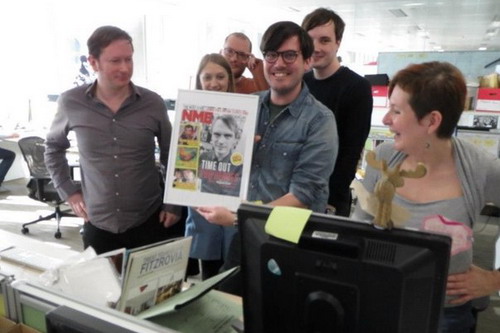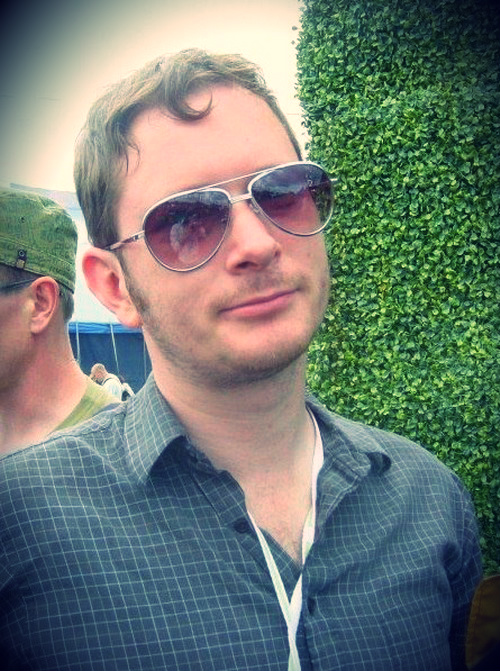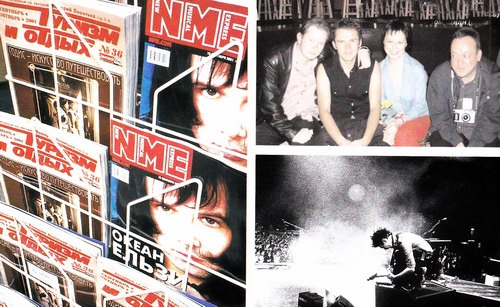Mark Beaumont is a British music journalist, one of NME 'star' writers, whose interviews, articles and reviews have also appeared in The Guardian, Classic Rock, The Times, Uncut and Melody Maker. His first book 'Out Of This World: The Story Of Muse' was published in 2008 and he's since published three more music biographies. His debut novel '[6666666666]' is available on Kindle.

BritishWave.ru told Mark that we hold in high regard his confrontational style and bizarre metaphors and tried to find out what makes the life of a music journalist so exciting.
Hello, Mark. We, people who try to translate your works, call your unusual turns of speech 'beaumontisms'. What are your literary influences? Who were your favourite authors when you grew up?
I studied the classics a lot as a teenager – I read Shakespeare and Dickens avidly at weekends when most kids would've been out snorting glue, hence I have a base in purple prose but no chance of a base tan. My influences today very much depend on what I'm writing. My music journalism began as a combination of all of the NME writers I admired when I started writing in the 1990s – Johnny Cigarettes, Steven Wells, Sylvia Patterson, Simon Williams and others. My main ambition was to be as characterful and funny as them and I stole their jokes mercilessly. Eventually they all went and got proper jobs so I had to fend for myself, stylistically. My ethos is to try to make every sentence entertaining, no matter how weird, wonky and baffling they may become.
When I'm writing music books I try to keep it as straight as possible – I don't think people want jokes in serious biographies, they just make the whole thing seem cheesy. But I do think they appreciate a literary slant. So my blueprint for the Muse book particularly was 'Snowblind', a biography of a 1970s cocaine dealer called Zachary Swan, which was beautifully written.
When I'm writing fiction – I've written five novels in all now, and published the first of them last year on Kindle, called '[6666666666]', check it out if you're not of a nervous disposition – I always keep a copy of 'The Lime Twig' by John Hawkes by my side as inspiration on how a brilliant sentence should run, and also devour Ian McEwan and Faulkner.
When did you feel a desire to write and what were your first attempts at writing?
I was writing fiction long before I was writing music journalism. I started writing bad childish takes on Agatha Christie murder mysteries at around 10 years old and wrote short stories through my teens until completing my first novel at 18, another at 19, a third by 23. They were all awful but the practice – and the sure knowledge that I could write books – certainly helped. I was around 19 when I decided I wanted to write for NME, having seen all the exotic locations their journalists were being sent to do interviews. I wrote bad reviews to them for a couple of years before getting on a post-grad journalism course and dedicating myself to perfecting my reviewing style. They took me on when I was 22, after the (now defunct UK music weekly) Melody Maker offered me work and I started begging the NME twice a week to save me.
Do you ever reread your first articles? If yes what do you usually feel?
I do run across them occasionally as a lot of the work I do now involves looking through the NME archive. My feelings towards it are a mixture of 20% embarrassment and 80% envy. My younger self was very shouty and sweary but also a lot more enthusiastic, voraciously witty and full of outlandish imagery, opinion and ideas. I wish I was still so consistently unignorable.
Do you remember your 1st interview?
I don't remember my first minor interviews for the new band section, but I remember my first feature interview. It was with Gem from Heavy Stereo, who went on to join Oasis. He was lovely, and ended up playing me acoustic songs on the floor of a cheap hotel room in Torquay. My second interview was more impressive though – I got a tour of Wisconsin from Garbage.
Who was the dullest person to talk to (while taking an interview)?
J Mascis from Dinosaur Jr was painful. He'd listen to every question, think for thirty seconds and just say 'yeah'. Ditto Brian Wilson. But perhaps the worst was Joel from Crystal Castles, who fell asleep – or got bored and rang off – five minutes into a very stilted phone interview.
What was the craziest interview in your life?
It's pretty 'crazy' to find yourself sitting next to Paul McCartney talking to him about your favourite ever album ('Revolver', obviously), but in terms of antics, I once had Mark E Smith from The Fall throw me to the floor and bite my neck mid-interview – I think he got bored – and my trip to Mexico with The Kooks ended up with the bus driver taking a wrong turn in Tijuana and ending up at the US border at 1am, at which point we were searched for four hours by men with guns. But the craziest in terms of the impact it had was undoubtedly the interview I did with Keith Richards where he admitted to snorting his dad's ashes. The story went global and people were phoning me from Australia asking why I was on their TV.
Do you remember the time when the world of music began to attract you? What were the first bands that you fell in love with?
I fell for The Beatles early – from six or seven. I remember one birthday buying virtually all of their albums at once and immersing myself in them until I was about 11.
I floated along on those and my dad's record collection – ELO, Peter Gabriel, 70s prog stuff – until Pixies turned me on to the Dark Side when I saw the video for 'Monkey Gone To Heaven' on a Saturday morning music TV show. I was instantly lost to indie rock, discovered The Wedding Present, My Bloody Valentine, Teenage Fanclub and Blur, and when Suede came along in 1992 I found my niche. Britpop till I die.
Can you tell us about your first gig and your first festival experience?
Everyone in the music industry that I speak to went to a really cool 'first gig'. It was usually The Clash or The Smiths or Pixies or something. Mine was not in any way cool. A friend got me a ticket to see Level 42 at Wembley Arena in 1986. We were four seats from the very very back of the arena – there was us, then three empty seats then, right in the back corner, a reviewer on his own making notes in a pad. I must've thought 'that looks like a brilliant job'. Still, I was pretty dazzled by it all, especially when the tiny dot-sized Mark King started flying around the stage on a wire.
My first festival was Glastonbury 1992 – I was in the second year of university and bullied all of my friends into going down with me. The first day we got there I sat in front of the main stage watching Kirsty MacColl and The Breeders virtually all day and got so sunburnt my face swelled up to twice its normal size. I found the second stage and the market but didn't even know about the green fields that entire year.
I was sharing a small tent, camped on a steep slope, with five friends, one of whom fell in a river of piss on the first night. When Primal Scream were playing their legendary 'Screamadelica' set on the NME stage, I was at the main stage watching Carter The Unstoppable Sex Machine. I remember almost passing out from dope during Spiritualized and on the way home our driver had lost her car keys and we managed to rip off her steering wheel trying to break the steering lock to get home. I loved it so much I've been back every single year since.
Do you ever get tired of listening to new music?
It does become a 'job'. I have a huge stack of CDs that've been sent to me by labels by my stereo and it's a real chore to plough through them trying to find something you like. But having discovered Neutral Milk Hotel and The Magnetic Fields by this method, I can't not listen to everything, and when you do find something brilliant it makes your day.
What amazed you most of all when you came to Russia in the beginning of 2000s?
The architecture was incredible obviously – Red Square and the metro stations were jaw-dropping – but the friendliness of the people was just as startling. The team at NME Russia were so accommodating, showing me around Moscow and lavishing me with gifts of vodka, and Muse were mobbed everywhere we went, from being chased out of Red Square by fans who could have had no idea we'd be there for a photo shoot to scenes of actual Beatlemania at the stage door after the show. I was also struck by the bullish policing in the city – our car was pulled over and our driver fined for the tiniest reason at one point and at the gig that Muse played the police stopped everyone leaving after the gig for ten minutes, which was most strange. What's that about?
Have you learnt any new phrases apart from 'Я очен лублю те кошка' , 'Я работац в бассейн' and 'Я покупац адин шапка пожалста' since then?
Dva groshne vino pojalsta. I'm aware the few phrases I do know are grammatically incorrect so I apologize profusely for ruining your beautiful language, and I was amazed when I was allowed back to Moscow a few years later despite being a severe danger to the nation's cats. I have never failed at anything so badly as I failed my Russian exams.
Was it fascinating to travel with Muse when they were young and wild?
It's all a bit of a blur really. My entire twenties were a blur. When I talk to them or their sometime tour manager Glen they're always reminding me of stuff that happened that I've forgotten.

I recall being in Vienna with them in a surrealist playground, and Matt disappearing that night when he was supposed to be on the bus to another town. I remember being in Dom's room rammed with girl fans in Moscow, and in an otherwise empty private room in a Moscow nightclub while the party raged on downstairs. I remember watching Matt lobbing his guitars very violently at Dom's kit in an otherwise staid venue in Paris around the first album, and many a fuzzy aftershow in London as 'Plug In Baby' crept towards release.
There was a long night on the wine with Chris after the NME Awards one year and I was swept along in a crew throwing the white orbs out into the crowd at the Reading Festival they played for 'Origin…'.
What was fascinating about it was watching them open up from the quiet, defensive kids I first met in a West London café for their first national interview into these crazed, politicized rock stars. The interview I did with Matt in Vienna when he was talking about lobbing Molotov cocktails at politicians was eye-opening – previously he'd been very restrained in interviews and I felt I'd helped push him into opening up on his real opinions.
Will you continue writing their story?
I hope I'll be writing about Muse for as long as they're around, and probably a fair while afterwards. By interviewing them so often and writing the book I've kind of become their chief documenter. I've recently written an update on the Out Of This World book with 15,000 words of new interviews with the band in there from my time with them around 'The 2nd Law'. I don't know if there'll be any further updates.
Did anyone ever threaten you because of the things you write?
I once had a death threat from a 90s band called Hurricane No 1 for giving them a bad album review, which thankfully came to nothing.

Tom Odell's father called the NME office to complain about Mark's review of his son's album
And Paul Weller once invited me, via letter, for a fight in the NME office car park over another bad review, but he seems to have forgiven me now. I met him for the first time a few months ago and he was very charming.
In Russia we don't have any serious music magazines anymore. Is it hard for British music press to survive?
It's a very big question. Music magazines have been closing sporadically in the UK for some time and readerships are falling in pretty much every area. Yet NME.com is a huge, thriving success, so the brand is stronger than ever. I'm not involved in any high-level decision making at NME so I'm not sure what approaches are being planned or measures taken, but I'm sure every effort is being made to ensure NME survives or evolves for its new breed of readership. Individual freelance journalists are really struggling though – word counts are dropping and magazines closing, which means less money and outlets for our writing.
I've been very lucky to have had almost 20 years of writing about music and have more work now than I ever have, but I'm wary that it could all end tomorrow.


 41 невероятный факт о Radiohead - к 41-му дню рождения Джонни Гринвуда
41 невероятный факт о Radiohead - к 41-му дню рождения Джонни Гринвуда Sufjan Stevens - Carrie & Lowell (2015)
Sufjan Stevens - Carrie & Lowell (2015) Концерт Arms And Sleepers @ Клуб da:da:
Концерт Arms And Sleepers @ Клуб da:da: Youth Vintage
Youth Vintage Магелланово Облако
Магелланово Облако Monokens
Monokens RetroElektro
RetroElektro Торба-на-Круче
Торба-на-Круче Сабака
Сабака Лензвук
Лензвук The Freaks
The Freaks Океаны
Океаны


